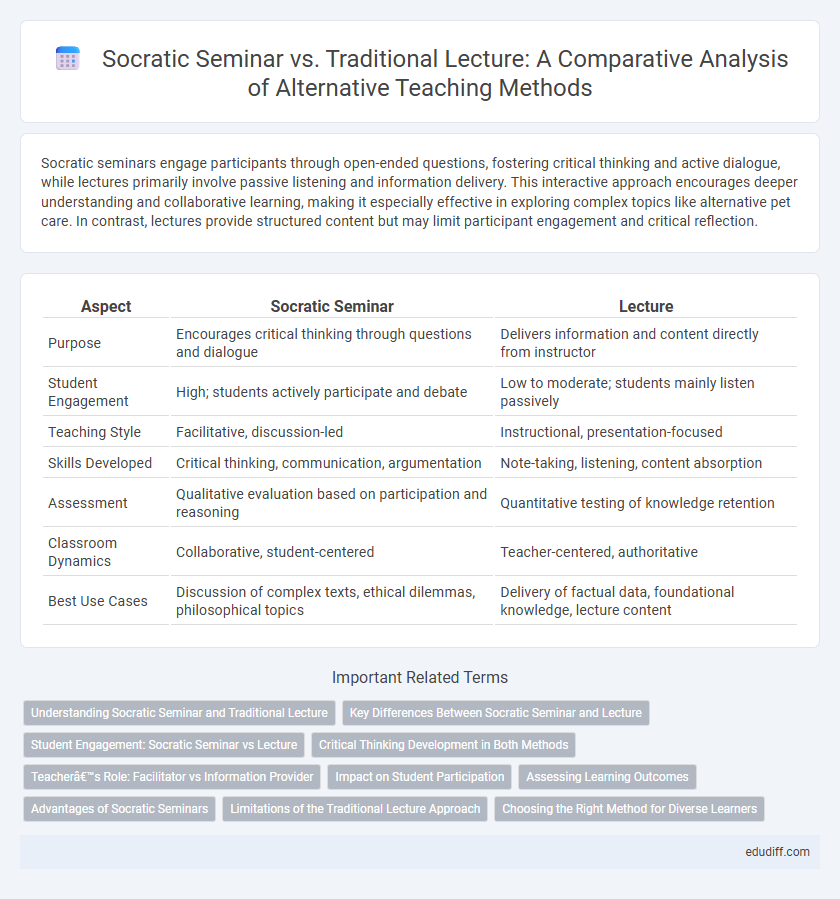Socratic seminars engage participants through open-ended questions, fostering critical thinking and active dialogue, while lectures primarily involve passive listening and information delivery. This interactive approach encourages deeper understanding and collaborative learning, making it especially effective in exploring complex topics like alternative pet care. In contrast, lectures provide structured content but may limit participant engagement and critical reflection.
Table of Comparison
| Aspect | Socratic Seminar | Lecture |
|---|---|---|
| Purpose | Encourages critical thinking through questions and dialogue | Delivers information and content directly from instructor |
| Student Engagement | High; students actively participate and debate | Low to moderate; students mainly listen passively |
| Teaching Style | Facilitative, discussion-led | Instructional, presentation-focused |
| Skills Developed | Critical thinking, communication, argumentation | Note-taking, listening, content absorption |
| Assessment | Qualitative evaluation based on participation and reasoning | Quantitative testing of knowledge retention |
| Classroom Dynamics | Collaborative, student-centered | Teacher-centered, authoritative |
| Best Use Cases | Discussion of complex texts, ethical dilemmas, philosophical topics | Delivery of factual data, foundational knowledge, lecture content |
Understanding Socratic Seminar and Traditional Lecture
Socratic Seminar promotes critical thinking and deep comprehension by encouraging students to engage in dialogue, ask questions, and explore multiple perspectives based on textual evidence. Traditional lectures focus on one-way information delivery from the instructor to students, often resulting in passive learning and limited student interaction. The interactive nature of Socratic Seminars fosters active participation and helps develop higher-order thinking skills compared to the more didactic approach of traditional lectures.
Key Differences Between Socratic Seminar and Lecture
Socratic Seminars emphasize interactive dialogue, critical thinking, and student-driven questioning, fostering deeper understanding through collaborative exploration of ideas. Lectures deliver information primarily through one-way communication from instructor to students, focusing on content transmission and retention. Key differences include the active participation in Socratic Seminars versus passive reception in lectures, and the development of analytical skills versus memorization of facts.
Student Engagement: Socratic Seminar vs Lecture
Student engagement in a Socratic Seminar is typically higher than in a traditional lecture due to active participation and critical thinking through open-ended questioning. Socratic Seminars encourage dialogue, allowing students to explore ideas collaboratively and deepen comprehension, contrasting with the passive reception often found in lectures. This interactive format promotes sustained attention and deeper cognitive involvement, enhancing learning outcomes and retention.
Critical Thinking Development in Both Methods
Socratic Seminars significantly enhance critical thinking by encouraging active dialogue, questioning, and reasoning, allowing participants to deeply analyze and synthesize ideas. Lectures primarily deliver information passively, which may limit opportunities for immediate critical engagement and reflective thought. Research indicates that interactive methods like Socratic Seminars foster higher-order thinking skills more effectively than traditional lectures.
Teacher’s Role: Facilitator vs Information Provider
In a Socratic Seminar, the teacher acts as a facilitator who encourages critical thinking and guides students through open-ended questions, fostering a collaborative learning environment. In contrast, during a lecture, the teacher primarily serves as an information provider, delivering content directly to students with limited interaction or student input. This shift from facilitator to information source fundamentally changes the dynamics of classroom engagement and student participation.
Impact on Student Participation
Socratic Seminars significantly increase student participation by encouraging open dialogue, critical thinking, and active questioning, fostering a collaborative learning environment. Lectures tend to limit student interaction, as they primarily involve passive listening and note-taking, which can reduce engagement and critical analysis. Research shows that students involved in Socratic Seminars demonstrate higher retention rates and deeper understanding due to their direct involvement in the learning process.
Assessing Learning Outcomes
Socratic Seminars encourage critical thinking and active participation, allowing instructors to assess students' comprehension and analytical skills through dialogue and inquiry-based discussion. Lectures primarily deliver content passively, making it challenging to gauge immediate understanding or deeper cognitive connections. Assessment in Socratic Seminars aligns with evaluating reasoning, argumentation, and engagement, whereas lectures often rely on traditional testing methods to measure retention.
Advantages of Socratic Seminars
Socratic Seminars promote critical thinking and active participation by encouraging students to explore ideas through open-ended questions and dialogue. This method enhances comprehension and retention by allowing learners to articulate their thoughts and engage with diverse perspectives. Unlike lectures, Socratic Seminars foster collaborative learning environments that develop communication skills and deeper analytical abilities.
Limitations of the Traditional Lecture Approach
The traditional lecture approach often limits student engagement by promoting passive learning and reducing opportunities for critical thinking and dialogue. This method can hinder knowledge retention as it typically involves one-way communication without fostering interactive exploration. The lack of student participation and real-time feedback in lectures restricts deeper understanding and responsiveness to diverse learning needs.
Choosing the Right Method for Diverse Learners
Socratic seminars foster critical thinking and active student engagement, making them ideal for diverse learners who benefit from dialogue and collaborative exploration. Lectures deliver structured content efficiently, suiting learners who prefer auditory information and clear guidance. Selecting the appropriate method depends on learner preferences, learning objectives, and the desired depth of understanding.
Socratic Seminar vs Lecture Infographic

 edudiff.com
edudiff.com